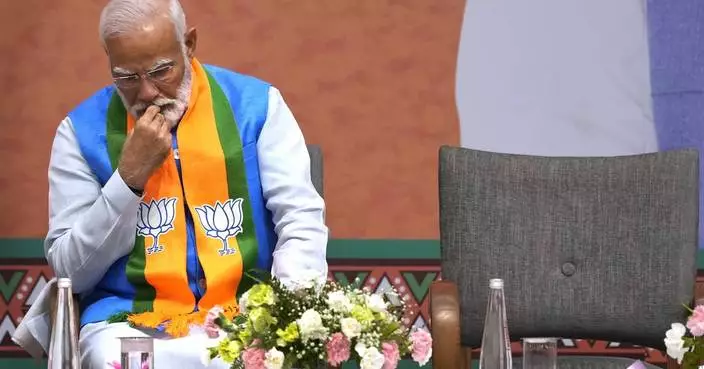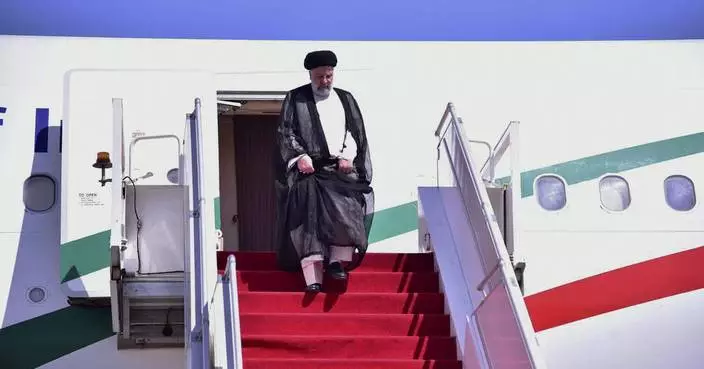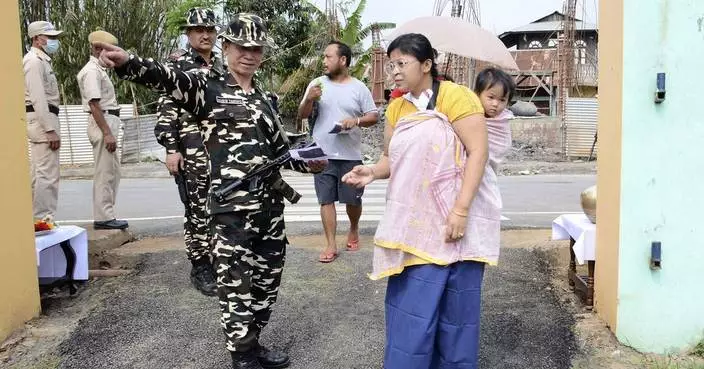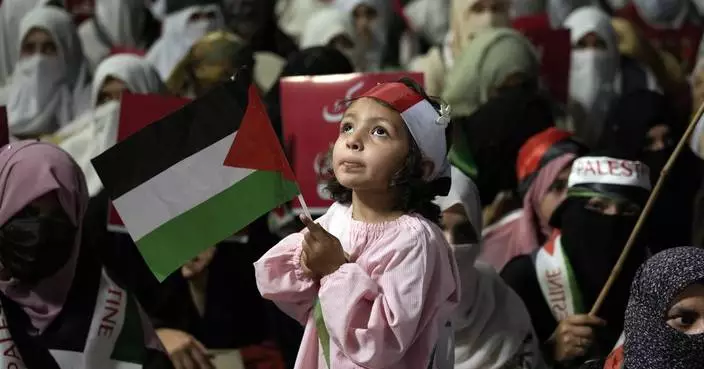Indian and Pakistani forces traded fire along the highly militarized frontier in disputed Kashmir early Wednesday after Pakistani firing killed at least four Indian paramilitary soldiers and injured three others on border patrol, Indian officials said.
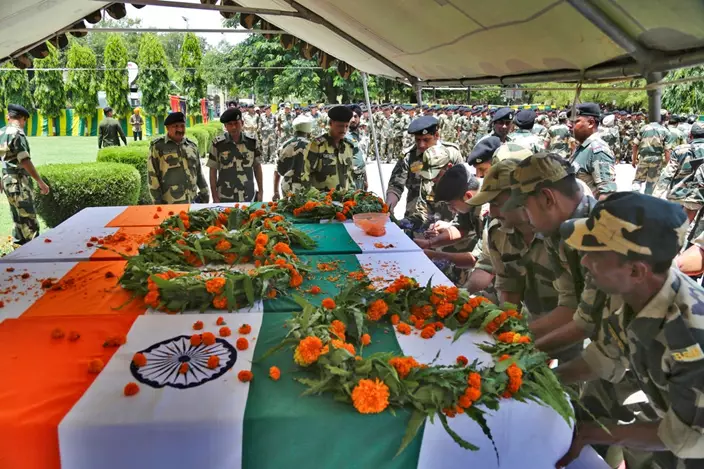
Indian Border Security Force (BSF) soldiers pay tribute to four of their colleagues who were killed early Wednesday during a wreath-laying ceremony at the BSF headquarters in Jammu, India, Wednesday, June 13, 2018. (AP Photo/Channi Anand)
Pakistan denied initiating the firing, saying its soldiers only responded to the Indian "unprovoked" fire. Islamabad also summoned an Indian diplomat to protest a civilian's killing.
Click to Gallery
Indian and Pakistani forces traded fire along the highly militarized frontier in disputed Kashmir early Wednesday after Pakistani firing killed at least four Indian paramilitary soldiers and injured three others on border patrol, Indian officials said.
Pakistan denied initiating the firing, saying its soldiers only responded to the Indian "unprovoked" fire. Islamabad also summoned an Indian diplomat to protest a civilian's killing.
Indian border guards said Pakistani soldiers first targeted a soldier around midnight by sniper fire as the Indian soldiers patrolled a border area in the Jammu region.
They said Indian soldiers retaliated, and the cross border firing stopped early Wednesday.
Pakistan summoned an Indian diplomat to protest the "unprovoked cease-fire violation" that killed a civilian. The Foreign Ministry said in a statement that the "deliberate targeting of civilian-populated areas was deplorable" and that cease-fire violations threatened peace and security.
The nuclear-armed nations had recently agreed to stop fire exchanges along the volatile frontier and uphold a cease-fire accord dating back 15 years.
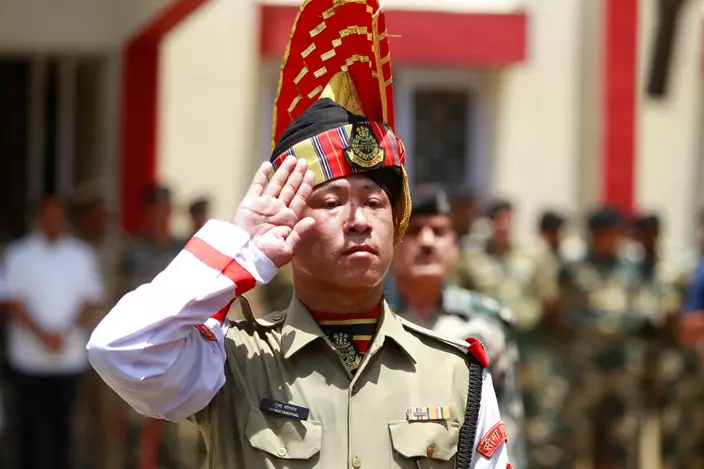
An Indian Border Security Force (BSF) soldier pays tribute to four of their colleagues who were killed early Wednesday during a wreath-laying ceremony at the BSF headquarters in Jammu, India, Wednesday, June 13, 2018. (AP Photo/Channi Anand)
Indian border guards said Pakistani soldiers first targeted a soldier around midnight by sniper fire as the Indian soldiers patrolled a border area in the Jammu region.
As other soldiers tried to rescue their fallen comrade, Pakistani soldiers opened a volley of gunfire at them, triggering further exchange, two border officials said. The two, who spoke on condition of anonymity in keeping with border guards' policy, said three soldiers were killed on the spot while the other died later while being evacuated.
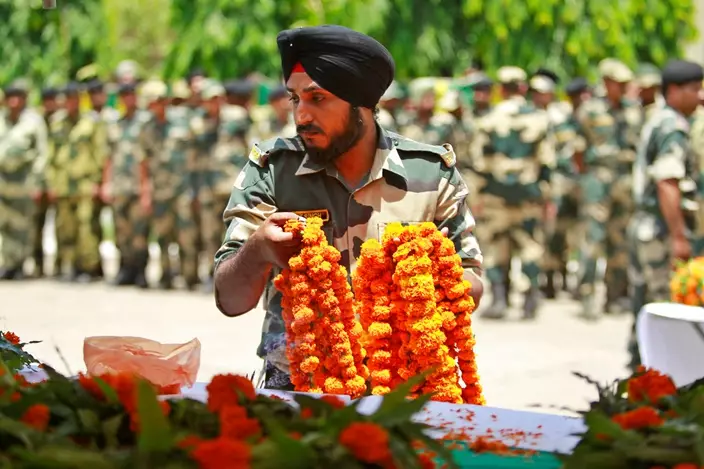
An Indian Border Security Force (BSF) soldier pays tribute to four of their colleagues who were killed early Wednesday during a wreath-laying ceremony at the BSF headquarters in Jammu, India, Wednesday, June 13, 2018. (AP Photo/Channi Anand)
They said Indian soldiers retaliated, and the cross border firing stopped early Wednesday.
In Islamabad, two security officials said Pakistani troops only returned fire after coming under unprovoked fire from the Indian border guards.
The officials said India troops also targeted a village in Pakistani-controlled Kashmir on Tuesday, killing a villager who was grazing cattle in a field near his home. The officials spoke on condition of anonymity as they were not authorized to talk to reporters.
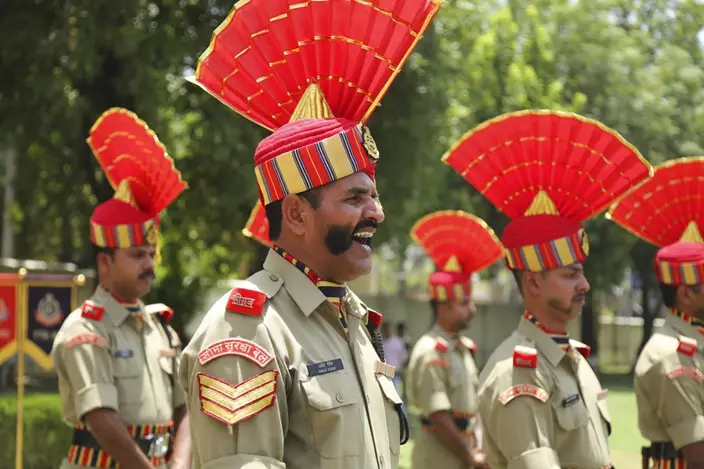
Indian Border Security Force (BSF) soldiers pay tribute to four of their colleagues who were killed early Wednesday during a wreath-laying ceremony at the BSF headquarters in Jammu, India, Wednesday, June 13, 2018. (AP Photo/Channi Anand)
Pakistan summoned an Indian diplomat to protest the "unprovoked cease-fire violation" that killed a civilian. The Foreign Ministry said in a statement that the "deliberate targeting of civilian-populated areas was deplorable" and that cease-fire violations threatened peace and security.
In May, Indian and Pakistani commanders of military operations talked by phone and agreed to defuse tensions in Kashmir. They also agreed to use existing mechanisms of hotline contacts and border flag meetings at local commanders' level to resolve the issues.
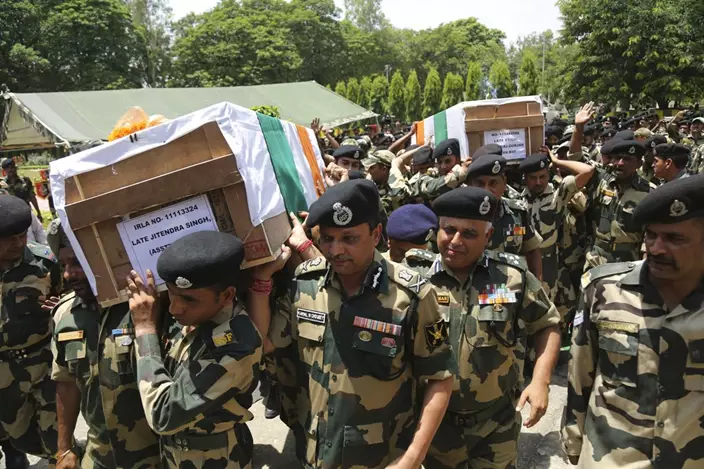
Indian Border Security Force (BSF) officers carry the coffins of four of their colleagues who were killed early Wednesday during a wreath-laying ceremony at the BSF headquarters in Jammu, India, Wednesday, June 13, 2018.(AP Photo/Channi Anand)
Early June, local border guards' commanders on the two sides met along the frontier and reiterated unsuccessfully to stop deadly hostilities.
Tensions have soared in recent months, as both sides have shelled border posts and villages, causing fatalities of soldiers and civilians on both sides. Tens of thousands of villagers have fled homes in dozens of affected villages along the frontier on both sides.
Like in the past, each side has accused the other of starting the hostilities in violation of the 2003 accord.
India and Pakistan have a long history of bitter relations over Kashmir, which both claim. They have fought two of their three wars since 1947 over their competing claims to the region.
This year, soldiers from the two nations have engaged in fierce border skirmishes along the rugged and mountainous Line of Control, as well as a lower-altitude 200-kilometer (125-mile) boundary separating Indian-controlled Kashmir and the Pakistani province of Punjab, where most of the latest fighting has taken place. This somewhat-defined portion, which India refers as "international border" and Pakistan calls "working boundary," is marked by coils of razor wire, watch towers and bunkers that snake across foothills marked by ancient villages, tangled bushes and fields of rice and corn.
The fighting has become a predictable cycle of violence as the region convulses with decades-old animosities over Kashmir, where rebel groups demand that the territory be united either under Pakistani rule or as an independent country.
NEW DELHI (AP) — The hugely popular Chinese app TikTok may be forced out of the U.S., where a measure to outlaw the video-sharing app has won congressional approval and is on its way to President Biden for his signature.
In India, the app was banned nearly four years ago. Here's what happened:
In June 2020, TikTok users in India bid goodbye to the app, which is operated by Chinese internet firm ByteDance. New Delhi had suddenly banned the popular app, alongside dozens other Chinese apps, following a military clash along the India-China border. Twenty Indian and four Chinese soldiers were killed, and ties between the two Asian giants plunged to a new low.
The government cited privacy concerns and said that Chinese apps pose a threat to India’s sovereignty and security.
The move mostly drew widespread support in India, where protesters had been calling for a boycott of Chinese goods since the deadly confrontation in the remote Karakoram mountain border region.
“There was a clamour leading up to this, and the popular narrative was how can we allow Chinese companies to do business in India when we’re in the middle of a military standoff,” said Nikhil Pahwa, a digital policy expert and founder of tech website MediaNama.
Just months before the ban, India had also restricted investment from Chinese companies, Pahwa added. “TikTok wasn’t a one-off case. Today, India has banned over 500 Chinese apps to date.”
At the time, India had about 200 million TikTok users, the most outside of China. And the company also employed thousands of Indians.
TikTok users and content creators, however, needed a place to go — and the ban provided a multi-billion dollar opportunity to snatch up a big market. Within months, Google rolled out YouTube Shorts and Instagram pushed out its Reels feature. Both mimicked the short-form video creation that TikTok had excelled at.
“And they ended up capturing most of the market that TikTok had vacated,” said Pahwa.
In India, TikTok content was hyperlocal, which made it quite unique. It opened a window into the lives of small-town India, with videos coming from tier 2 and 3 cities that showed people doing tricks while laying down bricks, for example.
But for the most part, content creators and users in the four years since the ban have moved on to other platforms.
Winnie Sangma misses posting videos on TikTok and earning a bit of money. But after the ban, he migrated to Instagram and now has 15,000 followers. The process, for the most part, has been relatively painless.
“I have built up followers on Instagram too, and I am making money from it, but the experience isn’t like how it used to be on TikTok,” he said.
Rajib Dutta, a frequent scroller on TikTok, also switched to Instagram after the ban. “It wasn’t really a big deal,” he said.
The legislation to outlaw the app has won congressional approval and now awaits a signature from Biden.
The measure gives ByteDance, the app’s parent company, nine months to sell it, and three more if a sale is underway. If this doesn’t happen, TikTok will be banned. It would take at least a year before a ban goes into effect, but with likely court challenges, it could stretch longer.
In India, the ban in 2020 was swift. TikTok and other companies were given time to respond to questions on privacy and security, and by January 2021, it became a permanent ban.
But the situation in the U.S. is different, said Pahwa. “In India, TikTok decided not to go to court, but the U.S. is a bigger revenue market for them. Also, the First Amendment in America is fairly strong, so it’s not going to be as easy for the U.S. to do this as it was for India,” he said, in reference to free speech rights in the U.S. Constitution.
As Chinese apps proliferate across the world, Pahwa says countries need to assess their dependency on China and develop a way to reduce it as the apps can pose a national security risk.
The app is also banned in Pakistan, Nepal and Afghanistan and restricted in many countries in Europe.
“Chinese intelligence law and its cybersecurity law can allow Chinese apps to work in the interest of their own security. That creates a situation of distrust and it becomes a national security risk for others,” said Pahwa.
“There should be different rules for democratic countries and for authoritarian regimes where companies can act as an extension of the state,” he added.
—-
This story corrects the expert's erroneous reference to Fourth instead of First Amendment.
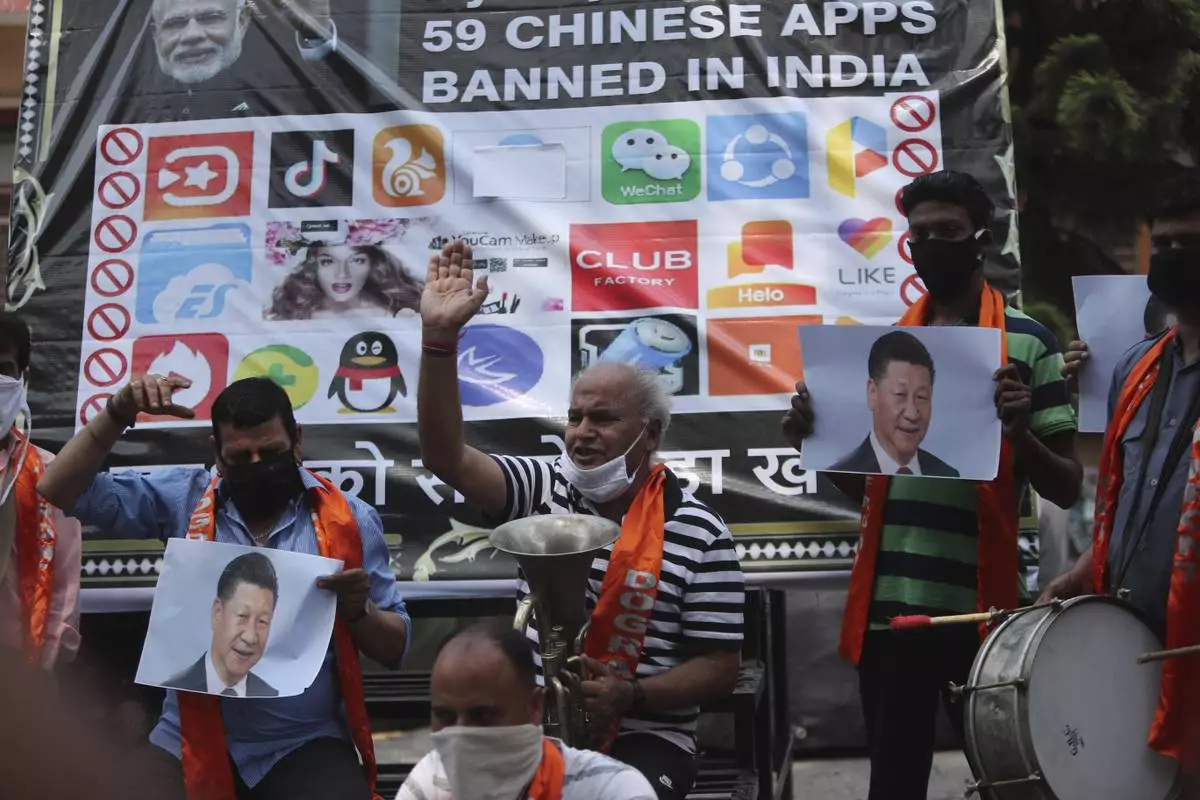
FILE- Activists of Jammu and Kashmir Dogra Front shout slogans against Chinese President Xi Jinping next to a banner showing the logos of TikTok and other Chinese apps banned in India during a protest in Jammu, India, July 1, 2020. (AP Photo/Channi Anand, File)









